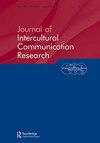想家还是想家?自我表露对留学生反向文化冲击的影响:一项混合方法研究
Q1 Social Sciences
Journal of Intercultural Communication Research
Pub Date : 2021-01-11
DOI:10.1080/17475759.2020.1866643
引用次数: 10
摘要
摘要本研究采用混合方法,调查了留学归来学生的自我揭露和反向文化冲击的影响。虽然之前的文献研究了重返社会的社会文化因素,但本研究使用285名从不同国家回国的国际大学生样本,探讨了沟通在重新适应过程中的作用。定量数据显示,在重返社会的四个阶段,自我披露的一些维度是反向文化冲击和困难的重要预测因素。定性研究结果揭示了自我揭露的原因,以及回国后分享经验的文化和人际挑战。讨论了通过自我披露等交流实践促进学生重返校园的意义和未来方向。本文章由计算机程序翻译,如有差异,请以英文原文为准。
Homesick or Sick-of-Home? Examining the Effects of Self-Disclosure on Students’ Reverse Culture Shock after Studying Abroad: A Mixed-Method Study
ABSTRACT This mixed-method study investigates the effects of self-disclosure and reverse culture shock among students returning from studying abroad. While previous literature examined the socio-cultural factors of re-entry, this study explores the role of communication in this readaptation process using a sample of 285 international college students returning home from different countries. Quantitative data showed that some of the dimensions of self-disclosure were significant predictors of reverse culture shock and difficulty during the four phases of re-entry. Qualitative findings revealed reasons for self-disclosure, as well as cultural and interpersonal challenges of sharing one’s experience when returning home. Implications and future directions are discussed to facilitate students’ re-entry through communicative practices like self-disclosure.
求助全文
通过发布文献求助,成功后即可免费获取论文全文。
去求助
来源期刊

Journal of Intercultural Communication Research
Social Sciences-Cultural Studies
CiteScore
2.00
自引率
0.00%
发文量
20
 求助内容:
求助内容: 应助结果提醒方式:
应助结果提醒方式:


